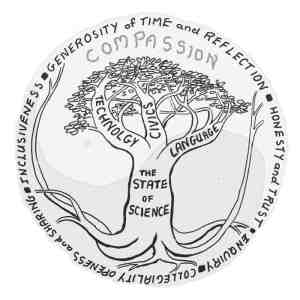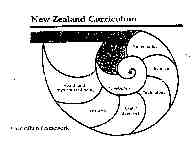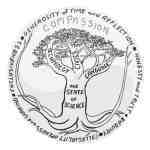|
|
|

Click
here to enlarge and compare curricula
Directions
for Learning -General Framework
Sustainable Perspectives
Learning Area -Civics
Learning Area -Language
Learning Area -Technology
Summary Note to Framework
Aug 2012
Note 1
See
here to compare illustrations of the New Zealand Curriculum
Framework and the Compassionate Curriculum Framework.
Note 2
Refinement of the definitions of learning areas means detail of Learning Area
frameworks is in urgent need of
review though the fundamental framework is sustained.
Directions for
Learning
|
Vision
All people will experience compassion, thus enabling them
to enjoy the state of science so they develop all manner of
sustaining arts (skills) including languages and civics.
|
Requisites
for the state of science to exist.
Compassion
with its capacities for:
Inclusiveness
Collegiality,
openness and sharing
Inquiry, wonder and forgiveness
Honesty
and trust
Generosity
of Time
and Reflection
|
Aspirations
Excellence;
Innovation,
inquiry and wonder;
Diversity;
Equity;
Democratic
communities;
Harmony
with universal balances;
Integrity,
Humility
and Respect. |
Key
Competencies
Enjoying
compassion;
Living
in the state of science;
Valuing
symbols, using language and texts;
Thinking
with integrity;
Self
respect;
Valuing
others;
Enjoying mindfulness
|
Learning
Areas
Civics:
exploring the nature of energy and how to use it
in sustainable ways.
Languages: exploring
the nature of symbols and how to conserve their
sustaining potential.
Technology:
exploring the nature of materials and how we can
use them to enhance our capacities in sustaining
ways.
|
|
|
Principles
Compassion
(for self, other humans and all else); Cultural
Diversity (Treaty of
Waitangi in New Zealand/Aotearoa); Care with
symbol use;
Enjoying the state of science; Truth without fear;
Embracing civics; Harmony, inclusiveness and connection.
|
|
|
Sustainable
Perspectives
Existence
can be viewed from myriad perspectives and ultimately each perspective is of equal
and vital value. These perspectives include physics, psychology,
chemistry, sociology, geography, history, symbol use (languages
including mathematics) and biology (including the human body).
Students will explore and appreciate:
The civics of any and all perspectives.
The sustaining language of any and all perspectives.
The sustaining technology of any and all perspectives.
TOP
Learning Area - Civics
(The art of living in sustainable ways.)
| Energy
is the potential of the universe(s). Humans are mortal forms and
cannot know the full potential. However the evidence is that we are
intimately involved with how that potential is manifest (The
Uncertainty Principle of Energy). Also this far no human in
recorded history has ever in any practical way found flaws in the
Conservation Principal of Energy which states that energy is so
bounteous it can be considered a constant and that it is subject
to constant transformations. Energy is manifest in every aspect of
existence and no aspect or form of existence can be called energy.
An aspect may be categorized as a form or source or manifestation or
type of energy and each aspect has its own unique symbol.
Students
will explore the nature of energy so they can appreciate its
potential more fully, understand how it is manifest and be better
able to live in harmony with its changing reality.
They learn to use imagination to engage unexpected outcomes and to
explore multiple solutions. They will learn to explore energy from
the following perspectives:
|
|
Psychology
studies the minds (including mental and emotional processes) of
humans and other sentient creatures and how we reflect and
respond to our changing universe.
|
Sociology
studies human and other societies for their social relations,
belief systems, organisation and capacity to adapt to change.
|
Physics
explores for principles governing matter and energy and their
interactions so we are able to understand and use the forces
affecting our universe.
|
Chemistry studies
the composition and properties of substances, and the reactions by which substances are produced from or
converted into other substances. |
Biology explores the origin, history, physical
characteristics, life processes, habits, etc. of living organisms
such as plants animals, and viruses.
|
|
Students will explore
their various Beings from the above perspectives. These shall
include the following Beings:
| Thermal Beings
- includes understanding and being in harmony with the
balances of the thermal flows of our universe |
Electrical Beings
- includes identifying all electrical phenomena and
sustainable uses of them |
Trace Beings-
includes understanding how the universe comprises of trace
elements and exploring their powers.
|
Human Beings-
includes our psychology, sociology and the civics that
sustains us |
Earth
Beings -includes understanding the tectonic forces of our
planet and the conservation of minerals and soils |
. |
| Ocean Beings-
includes understanding key water cycles and how we are
sustained by them. |
Atmospheric Beings- includes
knowing the power of our breath and our role in all
atmospheric processes |
Carbon Beings-
includes knowing key carbon cycles and being stewards of
carbon |
Solar
Beings - includes exploring our solar system and making
maximal use of our solar potential. |
Universal Beings - includes
knowing we are part of the universe and each of us can be
viewed as many types of being. |
|
|
.
|
|
|
. |
|
|
|
TOP
Learning
Area -Sustainable Language
(The art of employing sustainable uses of symbols.)
|
Languages
are sets of coincidences of meaning or
symbols that
enable sentient beings to communicate and share meaning. Symbols
enable all sentient beings to survive and procreate. Flawed uses
of symbols can destroy a species.
Our symbol use is a paradox in that it simultaneously reflects and
generates the state of our being. The gift is to be able to
transcend this paradox and thrive. We have wise guides in the
principles of physics.
Though a symbol may directly involve as few as one sense, its use is
governed by all the senses. This is because the choice of use of
symbol and the response to the symbol are both determined by the totality
of the experience of those sharing meaning through a symbol use.
The sets of symbols contain
grammar, or systems of rules, that are used to
manipulate the symbols and these are what give them their
communicative power.
Different
communities of users may employ the same sound, object, visual
display, motion, smell etc to convey very different meanings
within their community. With
humans, for instance, in Spanish communities the “nada” sound means
“nothing’ while in Serbian/Croatian/Bosnian communities it
means “hope”. In order to comprehend a community it is
necessary to understand both the unique meaning its ascribes to a
symbol and the grammar it adopts.
If
the Principle of the Conservation of Energy holds true then all
communities live in a flux of change. The language of a community
determines whether or not it reflects and communicates this reality
i.e. whether or not the community lives in harmony with the balances and flows of energy
transformations.
This
means any sustainable language embraces constant change and
is a “living” system.
The sustainability of any community is reliant
on its capacity to conserve the potential of its symbols to
reflect this universal reality of change. Failure to conserve this potential results
in a loss of viability and general harmony. By embracing the
Conservation Principle of Energy we are better able to transcend
the paradox of symbol use.
In
New Zealand Aotearoa students
will appreciate the power of symbols and grammar with particular
focus on English and Maori so they can explore and
become stewards of New Zealand’s unique culture. They will also
value other languages, including Mathematics, Drawing, Music and
Dance so they can better link to global
communities, comprehend the “biological” languages of
sentient beings on our planet and enjoy greater connection and
harmony with our planet's systems and the greater universe.
|
|
Mathematics
and Statistics -including
exploring and making use of patterns and relationships in
quantities, space and time so symbol use better reflects universal
processes and generates greater meaning.
|
English-
including understanding, using and creating oral, written, and
visual texts of increasing complexity in English so New Zealand
culture is sustained.
|
Maori-
including understanding, using and creating oral, written, and
visual texts of increasing complexity in Maori so New Zealand
culture is sustained
|
Other human
languages-
including the comprehension of a range of grammar protocols and
the use of strategies to learn human languages so the reflection
and insights of other human communities can be shared.
. |
Languages of
sentient beings-
Including identifying and comprehending the languages of the
communities of sentient beings inhabiting our planet so greater
meaning is found in Earth’s biological systems.
.
|
| Students will express their
various Beings and the meaning gained from their insights into
reality by learning languages and by learning
about languages. These shall include
the following Beings:
| Thermal Beings
- including communication of insights into the
balances of the thermal flows of our universe and the
care of them. |
Electrical Beings
- including reflecting the potential in all electrical phenomena and
sustainable uses of them. |
Trace Beings-
including expressing the trace
elements that comprise the universe(s) and reflecting on their powers.
|
Human Beings-
including our mythology psychology, sociology and the
civic systems that sustain us. |
Earth
Beings -including reflecting the tectonic forces of our
planet in language and our roles as stewards of its minerals and soils. |
. |
| Ocean Beings-
including reflecting key water cycles and our
roles as stewards of water. |
Atmospheric Beings- including
expressing the power of our breath and our role in all
atmospheric processes. |
Carbon Beings-
including reflecting key carbon cycles and our roles as stewards of
carbon. |
Solar
Beings - including reflecting the processes of our solar system and
sharing sustainable uses of our solar potential. |
Universal Beings - including
expressing how we are part of the universe and describing all the
different types of being each individual can be viewed as. |
|
|
.
|
|
|
. |
|
|
|
TOP
Learning
Area - Sustainable Technology
(The art of employing sustainable uses of materials.)
|
Technology
involves the use and transformation of materials to extend our
capacity to experience, reflect on and engage with the universal
potential. It inherently involves knowledge of the materials,
knowledge of the skills required to use the materials and
knowledge of the impacts of these uses. Science is understood to
be a moral way of being in the Compassionate Curriculum
Framework and thus all learning of technology is imbued with a
sense of stewardship/change.
| Thermal Beings
- including sustainable uses of the thermal flows of our universe. |
Electrical Beings
- including sustainable uses of the potential in all electrical phenomena. |
Trace Beings- including
sustainable uses of the trace
elements that comprise the universe(s).
|
Human Beings-
including sustainable uses of our mythology psychology, sociology
so our civic systems are enhanced. |
Earth
Beings including sustainable uses of the tectonic forces,
minerals and soils of our
planet. |
. |
| Ocean Beings- including
sustainable uses of the flows and balances of the
waters of our planet. |
Atmospheric Beings- including
sustainable uses of the flows and balances of the air
of our planet. |
Carbon Beings- including
sustainable uses of the flows and balances of the
carbon of our planet. |
Solar
Beings - including sustainable uses of the
solar potential of our planet. |
Universal Beings - including
exploring how we are part of the universe so all our beings
can be experienced as one.. |
|
|
.
|
|
|
. |
|
|
|
TOP
Summary
Note to framework:
The Compassionate Curriculum Framework was
generated as an alternative to the New Zealand National Education
Curriculum Framework. The latter teaches that science is an amoral way of thinking, as
in the Des Carte’s notion “I think, therefore I am”. Science is
framed as a study parallel to "The Arts", language, social sciences,
physical education etc and a small proportion of the population (less
than 1%) are described as “scientists”. The rest of us are deemed to
be non-scientists.
The Compassionate Curriculum teaches that science
is a profoundly moral state of being, as in the notion “I act, therefore I am”.
Science is framed as a state of being that all human beings are born
into and that this state of being ceases to exist when any of the major qualities of compassion
are lacking. All human beings experience the states of both science and
non-science to some
degree and no person is described as a “scientist”. Thus science is
framed as a way of being that enables all manner of arts (skills) including civics and
sustaining languages and technology. We are all artists to some degree.
In brief, the state of science
enables all that we enjoy as
civilisation to exist.
Implicit in the Compassionate Curriculum Framework is
the notion that education success is evaluated by measuring what
students do rather than what they say – which is the converse
principle to the education rationale that currently dominates Anglo-American
education. The focus is on what students say i.e. literacy, numeracy and
consumption. New Zealanders, for instance, destroy resources at a rate per
capita that is at least five times greater than what the planet can
sustain. Thus the National Education Curriculum Framework is evaluated
as profoundly flawed and non-sustainable.
Note
3 Aug 2012:
See
here for a comparison of illustrations of the New Zealand Curriculum
Framework and the Compassionate Curriculum Framework.
 
Page last updated:
Sept 2012
TOP
|
|
|